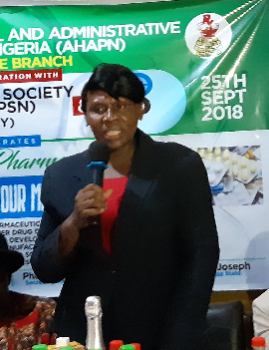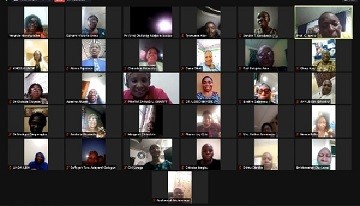
The Association of Lady Pharmacists (ALPs) an interest group of the Pharmaceutical Society of Nigeria (PSN) has saddled the incoming president of the Society with the responsibility of making the impact of the profession felt by those in the corridors of power, saying this will pave way for the advancement of the profession in achieving its goals and objectives according to global standard of practice.
National Chairman of ALPs, Pharm. (Mrs) Victoria Ukwu, made this remarks, while fielding questions from Pharmanews, shortly after her presentation, during the vitual programme organised by the association to commemorate the International Day of the Girl Child, recently. She urged the would-be PSN president, to ensure by all means that pharmacists are not left at the back of the scene, but the profession must be brought to the fore to garner all the necessary recognitions from policy makers in order to be able to make informed decisions among other professionals in the country.
Aside bringing the Society closer to those in the helms of affairs in government, she also encouraged pharmacists to join politics, stating that it may be another avenue to resolve some of the recurrent issues the profession has been battling with over the years. “We need to be involved in governance. I’m using this opportunity to encourage our dear president to continue in his political ambition, we need it and we will continue to pray for him and support him”.

Asked about her assessment of the Mazi Sam Ohuabunwa, led PSN administration, she rated him highly, especially with his innovation of regular Town Hall meetings, where he intimated pharmacists on progress made in the pursuit of various issues bothering the profession. His administration also secured the approval of the Consultancy Cadre for pharmacists, as well as his support for ALPs.
“The Mazi Sam Ohuabunwa led PSN administration has really tried in the area of information through the Town Hall Meetings, pharmacists were informed about issues concerning and affecting us and the profession. This has created the opportunity to dialogue and agree for the progress of the profession. His administration has also focused on the upliftment of pharmacists; an example is the approval of the Consultancy cadre for pharmacists. This is a great achievement in the history of the profession. The PSN president has supported ALPS and has given ALPS due recognition and we are very grateful for that. He was with us in Makurdi, Benue State for our 14th National Biennial Conference.
“The incoming PSN president should build on what the present administration has done and even more especially in the area of more visibility of Pharmacy in government through advocacy and encouraging/sponsoring pharmacists to join politics”, she stated.
Speaking on the theme of the 2021 International Day of the Girl Child “Digital Generation: Our Generation”, the keynote speaker Dr Tajudeen Abiola, consultant psychiatrist, Federal Neuro-Psychiatric Hospital, Kaduna, emphasized the importance of building the capacity of the girl child digitally, in order for her to be more productive professionally and economically.
He urged ALPians to always focus on the positive use of digital technology to girls in all their outings, while they should deliberately discourage the girls from engaging in social vices with digital devices, as it has the power to ruin their careers and totally terminate their lives, if they don’t thread with caution.
The Chairman of the occasion, who is also President, West African Postgraduate College of Pharmacists (WAPCP), Distinguished Prof. Ceciia Igwilo, pointed out the essence of the day, as it was established by the United Nations in 2012 for unearthing and addressing the fundamental challenges facing the girl child. She said it is: “A day to bring to light the struggles of a unique set, a day to amplify our voices against primitive statements that a particular gender is undeserving of certain rights and a day to discuss the benefits of investing on a girl child, recognising her hard work and aiding her to fulfill her potential.
“This day is observed to raise awareness on the implications of gender inequality and eventually create opportunities for every girl across the world. According to UNESCO, about 132 million girls are out of school, with about 15 million not likely to be in the four-walls of a classroom. And apart from access to education, the gender inequality is glaring in other facets of life including legal rights, gender violence, forced marriages and the list goes on…
“It is no news that investing on a girl child has proven to bring dividends to any society that committedly embraces the idea. For instance, educating a girl child can prevent early marriages, decline in child mortality, prevent disease, avert genital mutilation, enhance a stable community, nurture and empower women in the workforce. All of these as we know are critical to breaking the cycle of poverty and boosting economic growth of any nation”, she highlighted.
The Vice-Chancellor, Chrisland University, Abeokuta, Prof. Chinedum Babalola, in her own presentation titled: “Digitalisation: An enhancement to the asset the girl child is”, examined an array of girls and women, who have made names in the field of science and technology, saying digitalization has been a game changer in the education sector, as it has been effectively deployed as a prominent technique in the whole gamut of education. She stated how it has bridged the gap in physical distance as well as embedded more scientific means of impacting knowledge from tutors to students.
She mentioned different initiatives established as interventions against discrimination of girl-child such as the Annual International Girls in ICT Day, launched by the International Telecommunications Union (ITU);Digital Literacy for Women and Girls: Community Centres for Women’s Empowerment in ICT, and so on. These are meant to show the need to create more unfettered access to digital technology for the girl-child, towards changing the narratives in girl-child’s education.
Babalola therefore concluded thus: “Rather than making assumptions about what girls want and need from technology, we must work with them to create solutions to the issues that affect them by enabling them to learn digital skills. Technology can become a powerful tool for girls’ voices to become louder and even reach further”.
On her own part, Pharm. (Hajia) Zainab U. Shariff, director, Traditional, Complementary and Alternative Medicine, Federal Ministry of Health (FMoH), listed the major challenges facing the girl child in the society and proffered solutions to them, as she called for the abolishment of any cultural practice that oppresses the girl-child or prevent her from attaining her desired vision in life. Some of the problems of the girl-child she mentioned are: teenage pregnancy/obstetrics fistula, early marriage, domestic abuse, child sex traffic, child labour, rape, illiteracy, poverty among others.
In addressing these issues, she called for proper parenting of the girl child, educational empowerment, e skill acquisition, entrepreneurship, talent hunt in girls, implementation of Girl Child Right Act 2003 by all states of the federation, as these and others will brighten the future of the girl child.
Other participants at the event include: Chief (Mrs) Yetunde Moroundiya, former ALPs national chairman; Dr (Mrs) Modupe Ologunagba, ALPs national vice-chairman, South-West; Prof. (Mrs ) Olufunke A. Sodipo; Dr (Mrs) Afusat Adesina, ALPs chairman, Lagos State; Dr Arinola Jordan and others.











